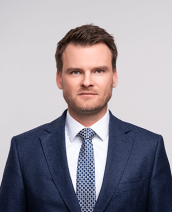Martin Rajnoha
Principal

Education
Past Experience

Martin is a Principal at Arthur D. Little, based in Prague, and a member of the Strategy & Organization and Automotive and Manufacturing (AMG) Practices, focusing primarily on technology and innovation management. Since joining in 2016, Martin has worked for clients in the energy, automotive, telecommunications, financial services, and public sectors. His most notable accomplishments include co-authoring several national reforms and strategies, including a national plan for expanding broadband technologies in Slovakia, and setting up operations for various public institutions in Central and Eastern Europe.
Martin is passionate about two topics in particular: sustainability and emerging technologies. He has worked to support the transition towards more sustainable transportation, as well as develop decarbonization strategies. Additionally, he has explored the potential of emerging technologies to disrupt traditional business models.
Before joining ADL, Martin had worked for IBM, P&G, and Capgemini. He holds a Master's degree in Cognitive Informatics from the Prague University of Economics and Business. Outside of work, Martin likes to hike, ski, and spend time with his family.

Is steel scrap the new gold?

The future of biomethane

Martin is a Principal at Arthur D. Little, based in Prague, and a member of the Strategy & Organization and Automotive and Manufacturing (AMG) Practices, focusing primarily on technology and innovation management. Since joining in 2016, Martin has worked for clients in the energy, automotive, telecommunications, financial services, and public sectors. His most notable accomplishments include co-authoring several national reforms and strategies, including a national plan for expanding broadband technologies in Slovakia, and setting up operations for various public institutions in Central and Eastern Europe.
Martin is passionate about two topics in particular: sustainability and emerging technologies. He has worked to support the transition towards more sustainable transportation, as well as develop decarbonization strategies. Additionally, he has explored the potential of emerging technologies to disrupt traditional business models.
Before joining ADL, Martin had worked for IBM, P&G, and Capgemini. He holds a Master's degree in Cognitive Informatics from the Prague University of Economics and Business. Outside of work, Martin likes to hike, ski, and spend time with his family.

Is steel scrap the new gold?

The future of biomethane
More About Martin
- University of Economics, PragueM.Sc. in Cognitive Informatics
- Ekonomicka UniverzitaBSc Business Informatics
- GE Money BankIT Manager
- CapgeminiTechnology Consultant
